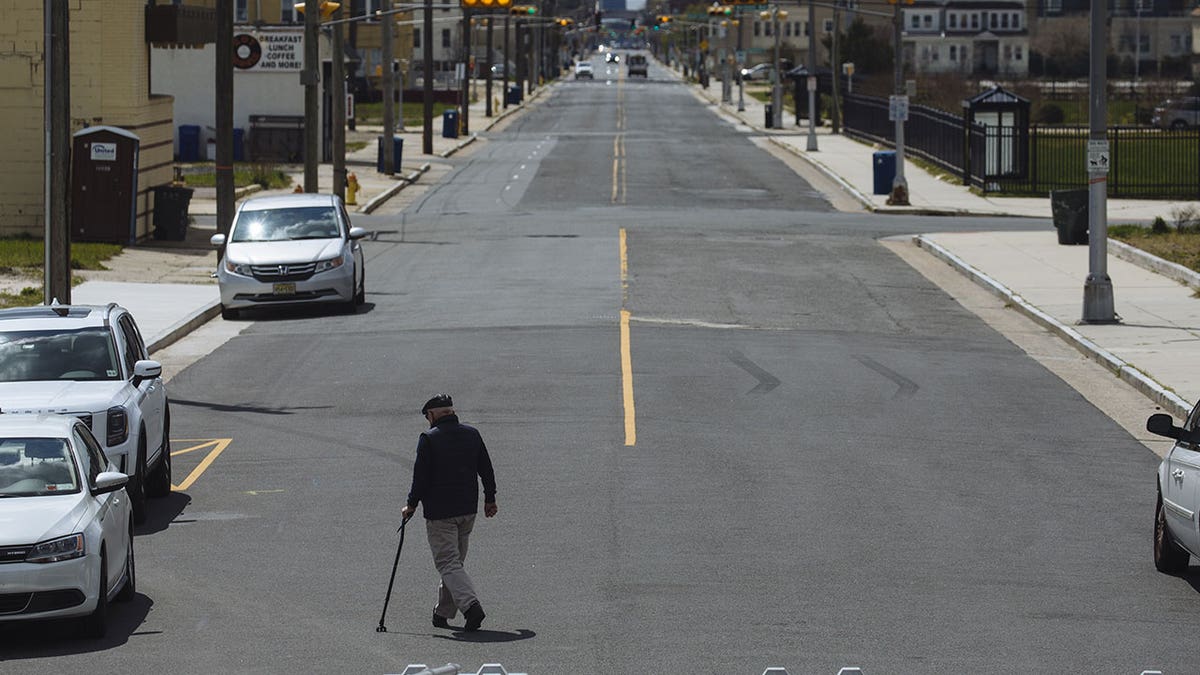Trump Plaza casino in Atlantic City demolished
The long-vacant Trump Plaza casino in Atlantic City, N.J., was reduced to a pile of rubble on Wednesday. Footage courtesy of WTXF.
Even with two lanes in each direction, the main road through Atlantic City can be choked with traffic, particularly on days when one or more big concerts are in town.
Now, to access federal and state highway safety money to repair the decrepit condition of Atlantic Avenue, the city is acceding to the main demand of both governments by narrowing the roadway from four lanes to two, in the name of protecting pedestrians.
Skeptics warn of even worse traffic jams to come in the gambling mecca. But the city dismisses their concerns about the changes, particularly in light of the free improvements it says it is getting.
ATLANTIC CITY MOBILE SUPERMARKET OFFERS RELIEF TO RESIDENTS STRUGGLING WITH FOOD INSECURITY
Atlantic Avenue spans the length of the resort, but it is not the road on which six of the city's nine casinos front. They are located along Pacific Avenue, a block to the east, which will remain two lanes in either direction.

A pedestrian walks down a street in Atlantic City, New Jersey, on April 16, 2020. In order to access $24 million in federal and state highway safety money, the city is acceding to demands to narrow decrepit Atlantic Avenue from four lanes to two in the name of protecting pedestrians. (Angus Mordant/Bloomberg via Getty Images)
Mayor Marty Small called the combined $24 million in federal and state funding that will pay for newly paved roads and sidewalks, and new street lights and synchronized traffic lights, "an absolute no-brainer."
"I live here," he said. "Everywhere I go, people talk about Atlantic Avenue, when are we going to pave, complaining," he said. "People keep talking about traffic. This is about safety. Atlantic Avenue is one of the most dangerous streets in the state of New Jersey."
A city-commissioned study on which the plan is partially based counted 829 collisions on the road between 2013 and 2017. Of those, 75 — or 9.1% — involved pedestrians being struck. Small said he knew several people who were killed in accidents on Atlantic Avenue.
Others say traffic is a very real concern. The Casino Association of New Jersey, representing Atlantic City's casinos, opposes the plan, known as the "road diet."
"At peak times during the summer, the city can't afford to go down to one lane in each direction," said Mark Giannantonio, the association's president and president of Resorts Casino. "The city needs to be designed for peak times. It's not always busy here but when it is busy, it's really busy. This road is not going to be able to handle the traffic."
Demi Delvalle runs a luncheonette on Atlantic Avenue, and says the road is often heavily congested, particularly in summer or when one or more large entertainment events are taking place in Atlantic City.
"It doesn’t make sense" to cut the road’s capacity in half, she said. "It’s always very busy. There are so many things happening, concerts, conventions. This is a bustling city."
Michael Chait, president of the Greater Atlantic City Chamber, one of numerous business organizations in the city, said his group applauds the repaved streets, additional lighting and traffic light synchronization.
"We're delighted about all that," he said. "But our concern is how 50% of the traffic on Atlantic Avenue gets displaced."
The reconfigured road will have a bicycle lane paralleling the vehicle lane in each direction, with a turning lane in the center. Proposals for a center median were rejected, and street parking is to be unaffected, Small said.
But the public safety component was a centerpiece of getting the funding, said James Rutala, the city's grant consultant. If the road were not narrowed, the grants would not have been approved, he said.
The plan has caused grumbling in the two years since it was first announced.
"It's a really dumb idea," said Elaine Rose, a frequent casino patron from the Atlantic City area. "In the summer, traffic on Atlantic Avenue is bumper-to-bumper with two lanes in each direction. Reducing it to one lane each way will create a nightmare."
ATLANTIC CITY STILL TURNING PROFITS, BUT BOTTOM LINES SHRINKING
Some residents support the plan. Scott Thomas said other shore towns have tried similar measures, including the nearby coastal resort town of Ocean City, without negatively impacting traffic. He also said bicycle lanes are a good idea.
"I understand events could overwhelm the avenue, but I still think it’s a great idea," he said.
Small, Atlantic City's mayor, said synchronization of traffic lights will overcome concerns about reduced traffic flow.
Getting the lights to all shine green or red at the same time has long been a rallying cry in Atlantic City. It has been frequently voiced by people from the lowest-income motorists to the global head of the Hard Rock gambling and hospitality empire, Jim Allen. He got his start in Atlantic City and has repeatedly complained about how frustrating it is to sit at a red light while the next one down the street is green.
"People say it's going to fail, that it's a stupid idea," Small said. "Guess what: This mayor is not afraid to fail."

